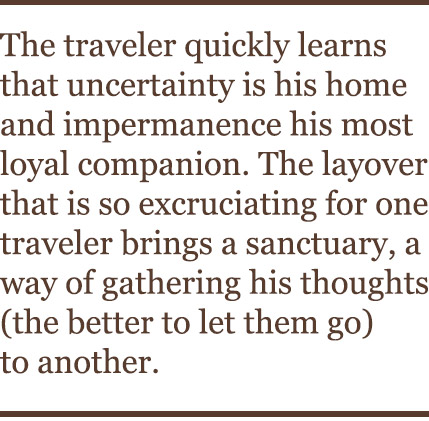I wake up in my bed at home and know the time without looking at my watch. Thick fog is blanketing the city below, which seems a potent metaphor. I walk in my sleep up the stairs to the kitchen and almost reflexively get out some tea bags, heat some water. I shower and shave and go to my desk. I know how this day will go, I think, and a part of me is right; I’m on top of my life—in the middle of it—and I can guide and control its flow.
That part is almost entirely wrong.
Three days later, I get off a plane in Shanghai. Lights are streaming all around me from the city’s 7,000 skyscrapers, each of them bathed in a different neon glow, purple or electric blue or green. A Maglev train, flying a few inches above the ground, whisks me into the heart of the labyrinth at 250 miles per hour. I walk through narrow alleyways, Chinese characters exploding around me, and all the teeming energies of 23 million people trying to make their future before tomorrow. I can’t read anything around me—can’t tell north from south or right from wrong; I only know that, 16 hours out of sync, I’ve stepped into some realm in my subconscious where certainties are gone and I have to give myself over to a larger logic.
Attention levels fall by 500% under jet leg, experts tell us, but in another way, I’m suddenly wide-awake, quickened by the foreign, alert to everything around me, all my senses at the setting marked “ON.” I’ve also stepped out of my daily haze, the somnambulism that is my life, and now the world can work on me as it sends me careening, pinball-like, from one shadowy corner to another. My possessions take up no more than a carry-on and small suitcase. I’m sleeping in a tiny, bare room that is not my own. Nobody knows me or can begin to place me; even better, I know nothing and exist outside all definitions. Everything is up for grabs.
This is not what everyone understands by “mindful,” but any real trip has at least some of the qualities of a retreat: you step a little back from the world you know, walk out of what you too easily call your life and look around, astonished. Objects come to you with a heightened clarity, and in the relative starkness of your circumstances, you can better make out the patterns of the mind and life, as everything is highlighted against a single, bold-color backdrop. Many a meditation retreat involves a kind of shock therapy; I get the same riding the bus for ten hours in India. Many a silent retreat is about clearing your head so as to see the passing clouds of the mind; I get that when I’m sitting on a mountain in treeless Iceland, looking out across great spaces of emptiness in the lunar light, the wind whistling in my ears.
 The true traveler knows that Antarctica and the Sahara are as nothing to the empty spaces and icy crevasses inside us, which travel can sometimes help us to confront. The person interested in movement knows that most of it takes place when one is absolutely still. Travel is only as good as the non-travel that lies at the heart of it
The true traveler knows that Antarctica and the Sahara are as nothing to the empty spaces and icy crevasses inside us, which travel can sometimes help us to confront. The person interested in movement knows that most of it takes place when one is absolutely still. Travel is only as good as the non-travel that lies at the heart of it
Jim Harrison, robust Zen maverick, has written that whenever he feels himself slipping into the deadness of routine, his eyelids growing heavy, he gets into a car and drives to some small-town motel for a few days, to recover his love of bars and the human form, the immensities of the American landscape. Ishmael, of course, begins his story in Moby-Dick by confiding, “Whenever I find myself growing grim about the mouth; whenever it is a damp, drizzly November in my soul…I account it high time to get to sea as soon as I can.” I find that I use travel—almost as much as I do writing—as a kind of meditation exercise, a training in mindfulness. As soon as I’m on the road, my eyes are open—and with them, my heart—life has real stakes and somehow I am far enough from the illusion of a life of my own to try to find a kinder way of moving through the world.
With the blinkers gone and the markers uncertain, I am confronted every hour with a riddle of right action or a stab to the heart. A child comes up to me in the Haitian street, hand extended, his eyes a plaintive search: what is the right thing to do? I can’t hide behind the flimsy structures of my life. I stumble into a movie-house in Beirut, and somehow The Human Stain affects me with an intensity that it would never find in the more populated, distracted busy street that is my life at home. My resume, my contacts are not going to get me anywhere in the wastelands around Los Angeles Airport; I have to find something human that’s not going to disappear in the next minute.

Explore Related Articles

